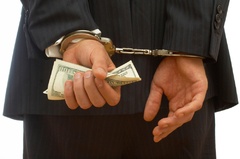While you might think you can spot some scams from a mile away, this latest one uses your own information against you. Consumers across the country are falling for a new debt collectors scam. Phony debt collectors call your house posing as lawyers and accuse you of being in default on a payday loan.
They may sound like the real thing because these scammers have personal information that can range for your social security number to old bank account numbers, in some cases they even had the names of personal friends and professional references. The Better Business Bureau thinks this information was collected in a data breach of payday loan services, and thousands of people may have their information compromised.
While the threat of going to jail over debt is a scary thing, there are things you can do to protect yourself. First, it is important to remember that under the Federal Trade Commission’s Fair Debt Collection Practices Act, debt collectors may not harass, oppress, or abuse any person while attempting to collect a debt, so the threat of being removed from your home and sent right to jail, is most likely an empty one.
Also, you can follow these guidelines, provided by the BBB, if you receive a suspicious phone call from a supposed debt collector, :
* Ask the debt collector to provide official documentation in writing which substantiates the debt.
* Do not provide or confirm any bank account, credit card or other personal information over the phone until you have confirmed the legitimacy of the call.
* Review recent copies of your credit reports to ensure that the alleged debt is not affecting your credit.
* File a complaint with the FTC online if the caller is abusive, uses threats or otherwise violates federal telemarketing laws.
* File a complaint with BBB online at www.bbb.org if you believe a debt collector is trying to scam you.
Full release from the Better Business Bureau:
Widespread Harassment from Phony Debt Collectors Raises Concerns of Mass Data Breach, Warns BBB
Scammers may have Social Security and bank account numbers, home addresses and employer information
Chicago, IL – August 5, 2009 – The Better Business Bureau is issuing an alert about phony debt collectors that are calling consumers nationwide and claiming that they have defaulted on a payday loan and will be arrested if they don’t pay immediately. Claiming to be lawyers, the scammers say they are with the “Financial Accountability Association” or the “Federal Legislation of Unsecured Loans” and are equipped with a disconcerting amount of personal information about their potential victims.
“Because the scammers have so much information about potential victims, the BBB is concerned that this may be the result of a data breach,” said Steve J. Bernas, president & CEO of the Better Business Bureau serving Chicago and Northern Illinois. “Thousands of people may have had their personal information compromised, and given the scammers’ tactics, it appears that those who have previously used payday loan services could be particularly at risk.”
According to reports received by the BBB and posted online, the scammers accuse the victim of defaulting on a payday loan and claim they are being sued. The phony debt collector threatens that, if the victim doesn’t pay as much as $1,000 immediately via wire or by providing bank account or credit card numbers, he or she will be arrested and extradited to California within the hour to stand trial. The scammers often may have the victim’s Social Security, old bank account numbers or driver’s license numbers as well as home addresses, employer information and even the names of personal friends and professional references.
The BBB offers the following advice to consumers if they receive a suspicious telephone call about an outstanding debt:
* Ask the debt collector to provide official documentation in writing which substantiates the debt.
* Do not provide or confirm any bank account, credit card or other personal information over the phone until you have confirmed the legitimacy of the call.
* Review recent copies of your credit reports to ensure that the alleged debt is not affecting your credit. Consumers can do this for free once every 12 months, and can find more information here: http://www.ftc.gov/freereports
* Under the Federal Trade Commission’s Fair Debt Collection Practices Act, debt collectors may not harass, oppress, or abuse any person while attempting to collect a debt.
* A debtor may be contacted between 8 a.m. and 9 p.m. only and can be contacted at work unless instructed not to.
* File a complaint with the FTC online if the caller is abusive, uses threats or otherwise violates federal telemarketing laws.
* File a complaint with BBB online at www.bbb.org if you believe a debt collector is trying to scam you.
According to complaints online, phone numbers that the scammers are calling from include: 949-468-5107, 415-200-0274, 415-200-0274, 213-784-5745, 408-715-1614 and many others.
To learn more about payday loans and debt collection services go to www.bbb.org.







Leave A Comment